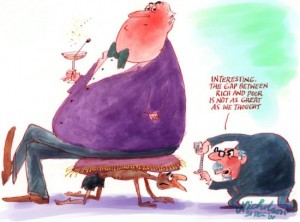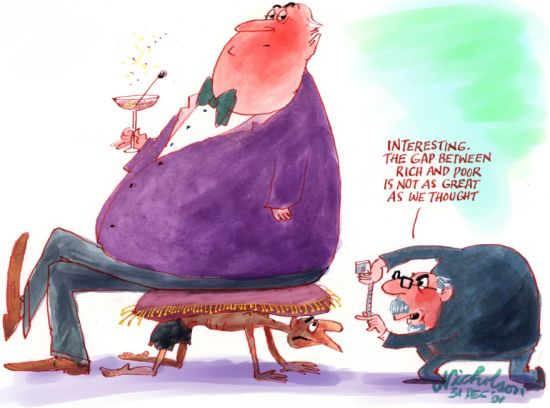Can the rich be saved? A Response by Philip Vinod Peacock

Three questions, theological and ethical
The central question of Mark’s reflection, on whether the rich can be saved, is a question that has bothered those who attempt to live as faithful and responsible Christians. As Mark as pointed out, the question is not a new one, it was one that has been asked by the ancestors of our faith and a question that we have to respond to both theologically as well as ethically today. I would personally believe that an appropriate answer to this question would involve the sifting through three connected but separate and specific theological and ethical questions.
Moral Discernment
The first of the questions is of course that of moral discernment, it asks the question of the morality of wealth in a context in which the majority is poor. Fact is that we live in a world with terrible poverty, the scandal of which is that although the world has more than enough resources to take care of each one of us, children continue to die from starvation. The ever increasing gap between the rich and the poor is a matter of serious concern. Today the world’s richest 20% receive 86% of the gross product of the world. The ratio of income levels between the top 5th and the bottom 5th of the world is 74:1, in 1960 it was 30:1. Perhaps in such circumstances, Mark’s question can be alternatively framed to ask whether it is the moral and ethical responsibility of the rich to take care of the poor. And even more so will they be judged if they do not? This was of course the question of Lazarus at the rich man’s gate (Luke 16: 19-31); the only apparent reason why the rich man was descended into hell was because he had a Lazarus at his gate!
The moral and ethical question as framed above however does not ask the question of the connection between the rich and the poor in the world. While it is common place to hear the cliché that the rich are becoming richer and the poor are becoming poorer as probably being deduced from the statistics above, what is not immediately apparent is that this cliché does not expose the whole truth. What is closer to reality is that the rich are becoming richer precisely because the poor are becoming poorer. To perceive reality from this perspective is to ask the deeper question, how did the rich become so? While a lot of teaching and thinking on economics within the context of Christianity is spent on how money is spent, very little is actually concentrated on how money is actually made. Deeper probing questions must be asked of whether the wealth creation of the political North was the result of the violence of the colonization of the South? Whether the wealth creation of men was the result of the appropriation of the labour of women? Of how race and caste have contributed to the wealth creation today’s elite? Or even further of how labour is commodified and exploited for the benefit of a few!
Justice
While the question of moral discernment and responsibility calls on the wealthy to take care of the poor, asking how the wealthy made their wealth in the first place is a question that brings into the discourse the question of justice. While the first question can be answered with charity, the second has to be a response from justice. In the Biblical perspective we are of course informed that the two are not diametrically opposed. Jose Miranda, the Latin American theologian, for example, informs us that the Hebrew word for almsgiving is sedekah which literally means justice. The underlying assumption means that we should return to the poor what we are stealing from them. The moral responsibility of the rich towards the poor is not a matter of their charity then as much as it is their responsibility to do restore what they have unjustly appropriated. It raises questions of how the rich became so in the first place.
The theological question
The last question that we have to ask is theological, it has to do with the only choice that Jesus has given us, the choice between God and Mammon (Matthew 6:24). It is a question that is addressed to each one of us, whether rich or poor: which do we choose, because no one can serve both God and Mammon. The word Mammon is first used in the New Testament and is usually taken to mean money, wealth or property. Many have tried to find an etymological meaning for the word. F. Hauck, for example, prefers to link it to the verb aman which means ‘that in which one trust’. E. Nestle on the other hand suggests that the word might also mean that which is entrusted to humans or that which nourishes or supports humans.
Mammon: A theological name for an economic process
Yet Mammon also has a more technical definition in the sense that it is used to name the process by which money is used to accumulate money – or what is called capital. It is this economic process that is given a theological name. It is Jesus who calls us to choose either God or Mammon and in doing so Jesus personifies money and recognizes that money was something that claims divinity.
Perhaps this is the greatest challenge before the rich today. Are they the beneficiaries of an economic system that places the raw pursuit of wealth over the interests and the well-being of people? Is the logic of profit undermining the values of justice and peace of the kingdom?
These are perhaps three related and connected questions that we have to consider while we reflect on Mark’s question of whether the rich can be saved. If however I have to offer a direct response to this question I would have to say that whether the rich can be saved or not depends on their relationship with the poor. If they share a just relationship with the poor then they will, however, I honestly cannot see how one can share a just relationship with the poor and continue being rich.


The dilemma for me becomes more the focus of what is viewed as the inclusion of wealth as “how much” as over against the cost of who is “left out” and at the price/profit of weapon sales, who is blown up
From a scriptural perspective I don’t think one’s economic status can in any way linked to one’s salvation. I know Liberation Theologians use some of these scriptures to good effect, but the bigger question is if that is its intended purpose. Take the Luke 16 story for e.g. The reason for the rich man’s being in hell can only be seen towards the end of the parable. He was in hell not because he was rich, but because he had failed to keep the Law.
Luke 16:30, 31 And he said, Nay, father Abraham: but if one went unto them from the dead, they will repent. And he said unto him, If they hear not Moses and the prophets, neither will they be persuaded, though one rose from the dead.
Once he was in hell he is told that he would have to suffer because he enjoyed his life on earth. But the primary reason for his being there was his disobedience to the word of God.
Elsewhere Jesus says: “It is impossible for the rich to enter heaven.” Liberation Theologians stop reading there. But then he fires the final salvo: “With man its impossible, but with God all things are possible.”